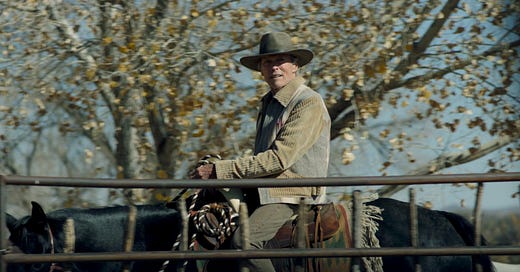Welcome to Late Eastwood, my tour through the late work of the still very much alive Clint Eastwood. This is a journey through the prolific director’s films since 2010, a period of his career with which I’m almost wholly unfamiliar. With his new film, Juror #2, on the horizon, I will be combing though the films leading up to it, so I can learn a bit more about what motivates a 94-year-old to keep practicing his art. These posts are for paid subscribers only, so you know what to do.
The journey is nearing its end. Juror #2 is out in (a few) theatres tomorrow, and I’ve officially caught up on Late Eastwood. I knew going in that Cry Macho was considered by most a step down from the highs of films like Sully and Richard Jewell and even The Mule, so I was prepared to be disappointed by this perhaps penultimate Eastwood picture. Maybe it was those checked expectations, but I liked Cry Macho, though I will say upfront, this is definitely a lesser picture. If Richard Jewell impressed me with its Billy Ray-penned script, Cry Macho did the opposite. It is easily the worst writing in any of these late period films. It’s quite bad, actually, and that really holds the film back. But this is Eastwood, and even working with a bad script, there’s enough of interest in the craft to make it basically work.
Clint himself, the man, the legend, stars in this film. A seeming swan song—not the first time he’s done this—for his onscreen persona, playing an aged cowboy in a western setting. All well and good until you realize that he’s way older than this character as originally conceived. Then you look up the movie’s history, and you learn it was actually a script originally written in the ‘70s, which back in 1988 almost got made with Eastwood in the starring role. That’s over 30 years ago! Some revisions were done to the script by Gran Torino writer Nick Schenk, but I get the sense that was mostly to get it into production shape for its mid-pandemic shoot. Eastwood really is too old for the part—much more the case here than in The Mule—and the lack of believability is a real detriment, as is his physical slowdown.




